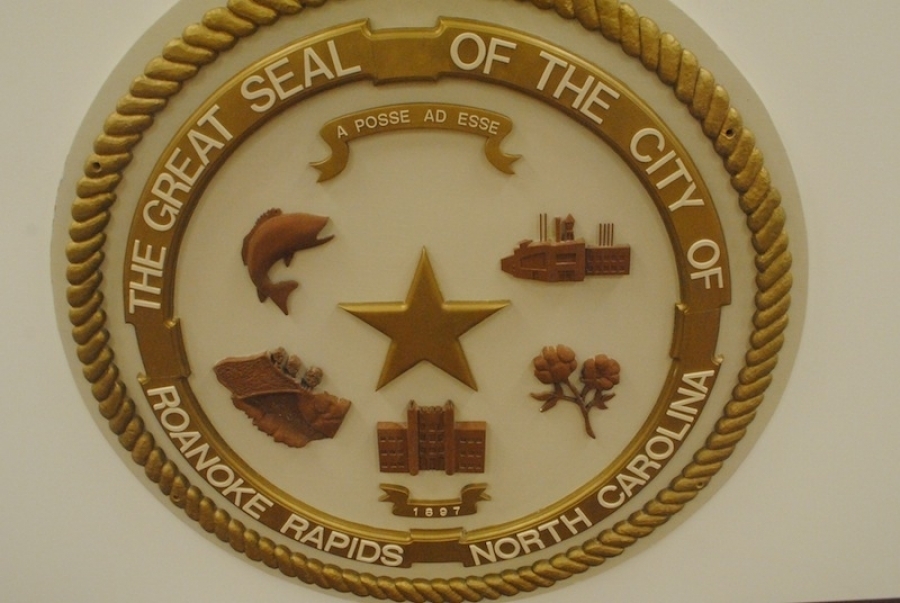No speakers Tuesday night objected to a proposed land use amendment that would allow gambling casinos in the Carolina Crossroads Music and Entertainment District.
The land use amendment, requested on behalf of the Carida Capital Group, which includes Bruce Tyler, owner of Weldon Mills Distillery and the former Roanoke Rapids Theatre which is in the entertainment overlay district, sets up the potential for the city to be chosen as a site for a casino should draft legislation be passed by the general assembly to allow them in Tier 1 counties.
Not going back to the 80s
Speaking during a joint public hearing between the planning board and city council on the matter, Linda Brewer, a Roanoke Resident who is also a county commissioner, said, “We’re not going back to how we were in the 80s. We have to find a new way to make our community viable financially and as a place people would choose to live.”
Brewer said there is no money coming from the city or the county in this matter. “We’re looking forward to what this project can bring to the county and to the city. It would certainly help us as the (American Rescue Plan Act) money fades away. That is a one-time, lifetime deal and it will soon be gone.”
Mayor Emery Doughtie said when he came on in 2009 the city had taken on $27 million worth of debt. “I just couldn’t imagine paying it off. When you pay on it every month it's like a 30-year loan. You’ll eventually get it paid off.”
Doughtie said the city went to work on trying to get the loan renegotiated. “Eventually we did, which saved the taxpayers quite a bit of money.”
When ground was broken on what would become the former Randy Parton Theatre, Doughtie said, “It was because everybody was saying ‘we’ve got to have jobs, we’ve got to have jobs.’ That was the place it looked like we could get jobs. Nobody knew what was going to happen in 2007.”
Doughtie said a good job was done in putting in the infrastructure. “We held on, making the payments. We didn’t hardly have enough money to pay the bill, much less to do anything else in the city.”
The ARPA monies have helped, the mayor said, but that money will play out and be gone. “Property tax, sales tax and any other kind of fees that would be generated, that would be ongoing. It’s a real game changer if we can be fortunate enough to have this.”
Doughtie recalled when he was younger the issue of liquor by the drink became a hot topic but eventually passed. “I don’t think that has had a real negative impact. People are going to gamble, they’re going to smoke, they’re going to drink. That doesn’t mean you have to do it — all things in moderation — and I think $3 or $4 million would be a nice moderate figure for us to bring in each month since our budget is only about $16 million for the whole year. It’s hard to fathom but that definitely is a lot of money and we’ve been talking for 14 years about what we’re going to do to make our community so people want to come to it — not so people want to leave here. We’ve got a chance to move forward.”
Ferebee's take
Councilman Carl Ferebee is the only sitting member who was on the panel during the initial discussions which brought the Randy Parton Theatre to fruition.
When he first came to town the mills were strong, employing 3,000 to 4,000 people. “It went from that to 2,500. It went from that to 1,400 to 1,500. It went down to 400 … and at that point the mills were gone.”
From the loss of those jobs Ferebee said the idea came that an entertainment district would work. “As you well know as history has it there were things that happened in relation to the economy that made it not happen.”
At the same time, Ferebee said, “The concept is finally looking like it’s coming around after so many years. For those that were in that initially, the belief was that it would happen. We just didn’t know when. At this point we’re hoping that it will happen. I think this will live up to one of its original intent.”
When the overlay district came there were trips to Branson and other places that had the things being discussed in Roanoke Rapids both then and now, he said. “At that point the legislature was not coming to North Carolina so that part was not put in it at that time. Now that it is, I believe that it will be wise for us to consider that.”
Former Halifax County Manager Tony Brown said he had been in the county since before the original concept. “Entertainment is hard,” he said, referring to a former employer in California who told him, “It’s a good year if they break even. Anything we do in entertainment is very difficult and with the theater and the bad economy a few years after that, it was like the worst case scenario.”
Brown said, however, he sees the current proposal as a great potential for the city and the area to be able to draw more revenue from people traveling I-95, which is around 40,000 vehicles a day.
'I personally think we need it'
Jan Morgan said, “Anybody who has concerns, I think they made a good point about the financing in the past — it was with the city — and that whole project and the filaments that went with that are totally different from what we’re talking about here.”
While there are no guarantees with what’s going on in the legislature, she said, “Hopefully that will get passed. It would be excellent in my opinion from a business perspective for this town, this community. The jobs it’s bringing in might not be $100,000 a year jobs, but if it gives people an opportunity for a living wage, I think that’s what we need. Littleton has their benefactor, Halifax has and that’s helping them. This is on a whole different level. I personally think we need it.”
She said her taxes here are more than the Outer Banks because tourists paid their county and city bills. “This is a way to help everybody. There’s no way it can affect your tax base going forward or there’s something seriously wrong and everybody better pay attention and get involved.”
Following the public hearing action was taken by both the planning board and city council — the planners recommending to the council to pass the land use ordinance amendment.
“I think it was well-stated from the public comments as well from the mayor and such,” planning board member Gregory Browning said. “It meets all the requirements for our land use ordinance as we’re trying to move in a different direction and wanting to diversify where we are right now to improve our lot as well as our citizens and retain our population.”
City council then moved forward with approving the statement of consistency and ultimately the land use amendment.
Bill White, the attorney who has been representing the Carida Group, said, “This means if the legislature approves casinos then we may be in the running for one.”








